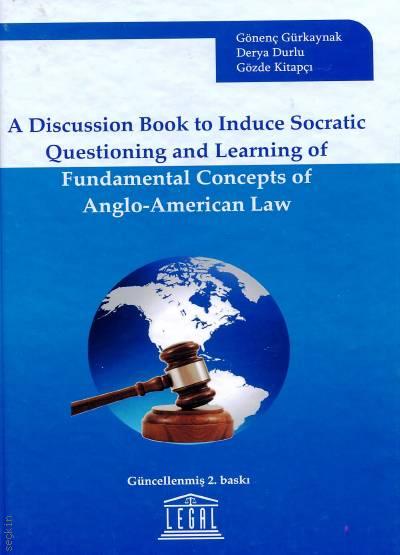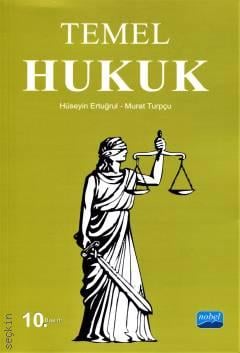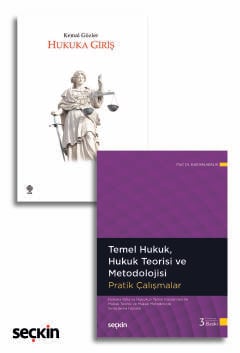
A Discussion Book to Induce Socratic Questioning and Learning of
Fundamental Concepts of Anglo – American Law
2. Baskı,
Şubat 2014
Kitabın Detayları
Dili:
Türkçe
Ebat:
17x25
Sayfa Sayısı:
653
Kitabın Fiyatı:
1.675,00₺
Temin süresi 2-3 gündür.
Kitabın Açıklaması
This book consists of selected materials, cases and questions providing intellectual nourishment to meet the needs of students and professors, teachers, other fellovv students,vvhoever happens to be facilitatingothervvise benefıting from the process of collective learning through socratic questioning in the field of "Fundamental Concepts of Anglo-American Law".
I have been "teaching", or, rather, facilitating and moderating, a course on Fundamental Concepts of Anglo-American Law for the last seven years at Bilkent University School of Law in Ankara. I have been learning law in many jurisdictions, through different methods and in different roles, for the last 18 years of my life, accounting for half of it. As a qualified member of the İstanbul Bar for the last 13 years, New York Bar for more than 10 years, and as a Solicitor of the Law Society of England & Wales for more than 7 years, I found the opportunity to compare fundamental tenets of legal thought in different jurisdictions quite a bit. One particular method of developing an understanding of the law appealed to me the most: Christopher Columbus Langdell's stili prevailing perception of how to teach and learn law exists since 1870, and as far as I know this is the fırst book to be published in Turkey truly attempting to use that method; i.e. the socratic method.
I chose each case, material and concept very carefully, after intense deliberation, vvith a vievv to stretching the minds of lawyers raised in a Continental legal system. There are three main objectives of this book: (1) To allovv for learning the fundamental concepts of Anglo-American Lavv, (2) To allovv for learning how to learn through socratic method, and (3) To challenge the reader to realize that what matters is learning to anticipate the consequences of choice of legal policy, rather than only memorizing legal principles which are often too literal to serve the demands of the specific issue at hand.
The third one is the most illuminating goal to be achieved vvith any student of the continental legal system. The code oriented approach of Continental legal systems and the habit of teaching the current status of the black letter lavv as the truth present endless opportunities to budding lavvyers to alienate themselves from the very consequences of their ovvn decisions and choices in the field of lavv. Only if they vvere to realize even as students that they vvill inevitably assume the duty to play in the joints of this machine called the lavv, they could then shovv the character to hold themselves accountable for their ovvn choices of legal policy in the future, rather than hiding behind the vvorkings and ready-made decisions of a mystical machine of lavv, as the machine vvould then be their servant and not vice versa. As their understanding of the indeterminacy of lavv vvould grovv, so vvould their avvakening to the fact that lavv vvill be vvhatever they do vvith it in the future...
Kitabın Konu Başlıkları

Author Biographies

Foreword

Index

Introduction

What is Precedent? Basic Training on Learning Law by Reading and Discussing Cases

Compulsory Reading: the Constitution of the United States

Separation of Powers: A System of Checks and Balances

Necessary and Proper Clause, Art. I, Sec.8, Cl.18 8

Commerce Clause

Executive Power

Due Process of Law

Substantive Due Process

Procedural Due Process

Equal Protection

Affirmative Action

Racial Gerrymandering

Gender & Sex Based Discrimination

Residency & Right To Travel

Right To Vote

Limits of Fundamental Rights

First Amendment Matters

Categories of Speech

Content Issues

Overbreadth and Vagueness

Prior Restraint

Establishment Clause

Administrative Law Basics

Selected Criminal Law Concept: Developments On Prohibition of Homosexual Sodomy

Selected Criminal Procedural Law Concept: Exclusionary Rule

Selected Torts Concept: Product Liability and the Frivolous Lawsuit Problem

Selected Law of Corporations Concept: Piercing the Corporate Veil

Selected Procedural Law Concept: Jury Trial Issues

Selected Conflicts of Law Concept: Law To Be Applied by Federal Court Over State Law Claim

Selected Contracts Law Concepts: Estoppel
Kitapla İlgili Kategoriler
Hakkımızda
|
Uluslararası Yayınevi Belgesi|
Kaynakça Dosyası|
Kişisel Verilerin Korunması |
Üyelik|
Siparişlerim|
İade Politikası|
İletişim


